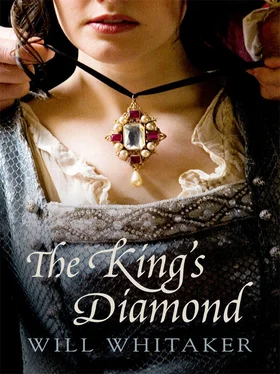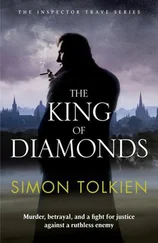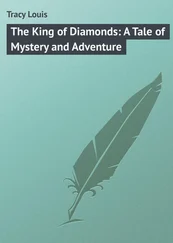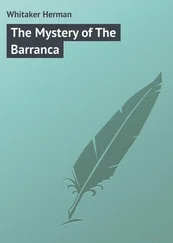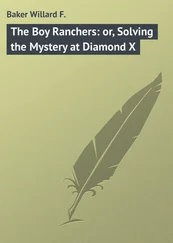‘Richard Dansey, Merchant, of London.’
They bowed in turn and presented themselves with their nations of origin: Milan, Lucca, the Duchy of Ferrara. Their eyes lingered on me. Plainly I was a mystery to them. I must have seemed a mere boy, with my light, sand-coloured hair and my beard that was little more than a wisp of down. I was still only twenty-one, and although I was tall, and had gained some skill with a sword, I was not of a powerful build. Too young to be a merchant, in their eyes, and not dressed like one, either. My clothes had more the air of a fashionable young noble’s. I wore a purple doublet slashed with white cambric, my shirtbands falling over it from the neck, each garnished with lace and ending in a gold button. My black wool cloak was edged in silver, and my rapier too was silver-hilted.
Piero Fieschi stepped forward from among the merchants with his partner and younger brother at his side. I held out to them the purse I had prepared hours earlier, containing ten gold ducats. Piero looked at me in astonishment.
‘Messer Dansey! We sail at once: but do you have no goods to load?’
Martin came panting up behind me. Fieschi glanced at the trunk on his shoulder, clearly pondering whether it might contain anything of value. Martin swung the thing roughly down on to the stones, and sniffed. Fieschi appeared to dismiss the idea. He gestured to the knot of merchants. ‘Our companions have loaded silks of Lucca and Genoa, and we have a solid stack of salt barrels belonging to Messer Pinotti here, of Milan: most welcome for ballast. But you, nothing? Truly nothing? You tell us you are a merchant: how will you turn a profit?’
‘I have my means.’ I smiled, delighting in their disappointed curiosity, and turned from them with a graceful bow. I stepped from the Mole to the wooden rungs of the entering ladder nailed to the Speranza’s waist, and pulled myself on board. Martin swung the trunk up on deck, hauling himself after it. While he asked in his London-accented Italian where he should stow my trunk, I strode around the decks, enjoying once more the feel of the planks beneath my feet and the smell of pitch in my nostrils.
The Speranza was a great ship of perhaps a hundred and twenty tons, slightly larger than the Dansey family vessel, the Rose, which I had left behind at Bruges in August. Peering down the open hatches I saw she had at least two orlops, between-decks where a man could not stand upright; here the goods were being shunted from the hatches and lashed into place. Furthest aft was the roundhouse or great cabin, from which several smaller cabins opened. In one of these I found Martin, sitting on the trunk and mopping his portly face, and cursing gently at the run I had led him through the port. I heard the rattle of the hatch cover as it was fastened into place, and the clank of the capstan as the sailors began warping the Speranza out into the bay on her anchor. All at once they broke into a song, a bawdy affair in local dialect, praising the part of the city known as Maddalena, which had the fairest churches, the richest markets, and the greatest number of brothels.
I stepped back inside the great cabin. It was of a fair size, raked back at the stern to a row of fine windows. My fellow passengers were all present, seating themselves about a table, in the high humour of men swept up in the risk and hurry of a new venture. Servants were pouring out glasses of sweet romney wine, and there were fried capons, as well as wafers, almonds and sweetmeats. Martin came out of our little cabin to attend me. This supper was my first meal since the early morning. I ate greedily and drank deep, and all of us talked and laughed more and more freely.
‘In Rome we shall buy from His Holiness an indulgence for trade with the Turk,’ Piero Fieschi was saying. ‘Without that, of course, any commerce with the Muslims would involve us in mortal sin. Then south to Naples, and over the sea to Cairo.’
‘Cairo!’ his brother picked up. ‘What wonders cannot be had in Cairo? We shall bring back silver and cinnabar, raisins, rosewater and sandalwood, cloves, porcelain and pearls, indigo and opium.’
Suddenly the Luccan, Messer Giordano, darted up from the table and into one of the cabins, and returned with a piece of silk some three yards long, shimmering crimson, pirled with a fine thread of silver. ‘Do not talk to me of Cairo. Feel this! Smell it! And tell me if the lands of the Turk can boast anything as fine!’ He draped it round our heads and we fought free of it, laughing. It had the true tang of new-spun silk, the stink o’ the worm, as the silkmen call it, and it was as smooth as the sound of lutes. The others were not to be outshone, and each dived into his cabin. Soon the table was festooned in cloths and colours, blood-red satins, green lustred taffetas, thick black velvets striped in gold with a pile as soft as cats’ fur; purple and maroon brocades with patterns stamped in silver that sparkled in the light from the oil lamps. We swam in the silks, laughing at the sheer luxury of it.
They would sell these marvels at the Court of Pope Clement in Rome. Any that were left they would take on to Naples, and offer up to the Spanish Viceroy. Even the Milanese Pinotti held out a handful of his greenish-grey salt, saying, ‘Taste it, taste it! Is it not the best?’ A Sienese called Basile tipped out a bag of hawks’ bells and dog whistles and thimbles, all in silver, that went tinkling and rolling about the table with the ship’s motion. One of the bells came to rest in front of me, and I stopped it with my finger. Their laughter was dying, and their eyes remained fixed on me. I was the only one who had not shown off any wares. I regretted that I had not taken on some cargo, just for appearances. A few casks of salt or some dried fish: anything. Their curiosity was a little too sharp. Without my intending it, my hand reached up to my throat to trace the outline of the steel casket that hung by a chain round my neck, hidden beneath my doublet and shirt. The thing was some nine inches long. A key secured it, sliding into a lock under the brass head of a cupid. Its surfaces were polished smooth by long concealment, close against my skin. That casket weighed on me, a precious burden, delicious but dangerous, and unutterably secret.
Martin, who stood behind my chair to serve me, caught his breath, and I put my hand back down on the table. The merchants’ stares flattered me, even as they disturbed me; their rich cloths made me feel part of a high and select band. Yes, I could count myself their equal. And soon I would rise higher still. I picked up the empty bottle of wine.
‘Gentlemen, should not this poor deceased bottle have an heir?’
Piero continued to stare. But several of them took up the cry of ‘Another bottle, another bottle’, and others joined in with ‘Let it be hippocras, hippocras!’
‘But have we a sleeve?’ asked Basile. The elder Fieschi went to a cupboard set in the wall and brandished in the air a cone of muslin: a sleeve of Hippocrates, invented by that ancient doctor for some purpose to do with healing the sick, but now used in the brewing of hot, spiced wine, known to all as hippocras. I saw Fieschi unlock a drawer and take out fragrant cinnamon bark and cassia, cloves and grains of musk. These he sprinkled into the bag, which he gave to a servant to take for’ard to the cookroom, along with another bottle of romney. The other men cheered. While we waited for the wine, I slipped out once more on deck, to give their curiosity time to cool. The sun had set, and the air was growing colder. Land was a bare line on the horizon now, black against the indigo of sea and sky. A tiny gleam marked the tower on the Mole where bundles of broom were burnt at night to guide ships into the port. A servant stepped out of the forecastle with a steaming pan of wine and swayed aft over the deck to the great cabin, trailing the scent of warm spices after him. Those smells made me think of home. In a few weeks, maybe, my work in Rome would be done, and then at last I would turn back: back home to the family warehouse, on the rain-soaked stones of Broken Wharf in the City of London. And I would have my triumph.
Читать дальше
